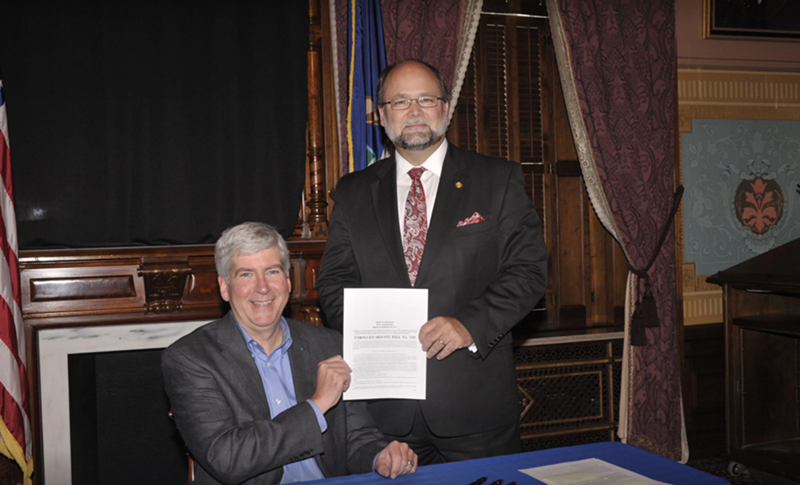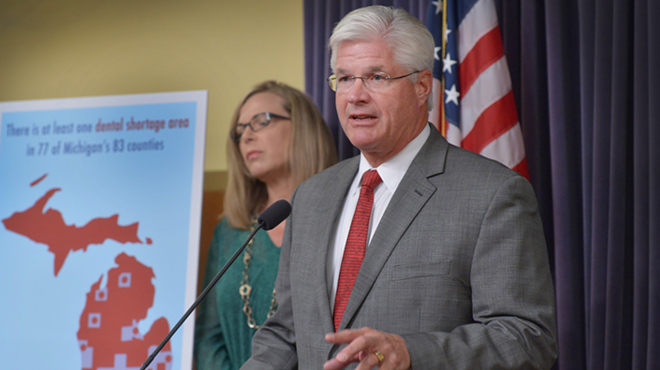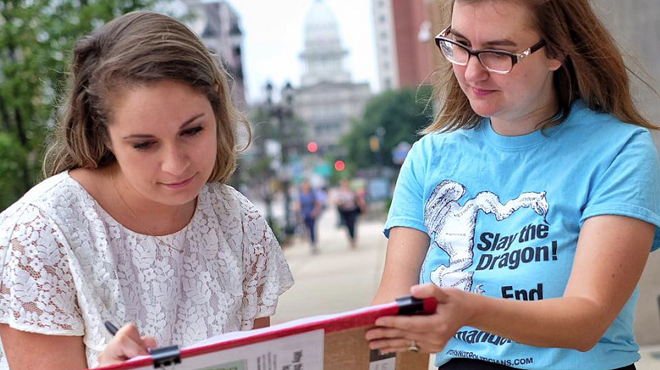GOP lame duck law making citizen ballot drives difficult is being challenged in court

Audio By Carbonatix
[
{
"name": "GPT - Leaderboard - Inline - Content",
"component": "35519556",
"insertPoint": "5th",
"startingPoint": "3",
"requiredCountToDisplay": "3",
"maxInsertions": 100,
"adList": [
{
"adPreset": "LeaderboardInline"
}
]
}
]

Arlan Meekhof/Facebook
Former GOP Senate Majority Leader Alan Meekhof and Rick Snyder, who helped orchestrated the 2018 lame duck power grabs.
One of the Michigan GOP's most controversial lame duck laws is facing a legal challenge.
A lawsuit filed Thursday in the Michigan Court of Claims argues that Republicans' 2018 changes to rules for citizen-initiated ballot drives are unconstitutional. The new law makes drives far more difficult and costly to execute.
The complaint argues that the law violates voters' free speech rights and constitutional right to petition the government.
The law — signed by former Gov. Rick Snyder in December — mandates that no more than 15 percent of the signatures gathered could come from any of the state’s 14 congressional districts. The law also requires that an entire page of signatures be disqualified if there's a clerical error on it, even if it's a minor error or was the signers' fault.
The League of Women Voters is the lead plaintiff, and they're represented by Mark Brewer, an attorney who's also representing groups in a legal challenge to the GOP's laws that gutted the citizen-initiated paid sick time and minimum wage increase proposals.
They claim the law is unconstitutional because valid voters can't participate in the petition drive once the 15 percent threshold is met. In other words, voters will be denied their constitutional right to participate in a petition drive.
"It is a mathematical certainty that [the law] would severely limit the ability of a vast number of Michigan voters to exercise their constitutional right to express their views and petition for change," the complaint reads.
The complaint notes that state law will require about 425,000 signatures for a citizen-initiated constitutional amendment in 2020. The total number of signatures collected from a district would be capped at about 64,000, which is 15 percent of 425,000. Assuming there are approximately 463,000 registered voters in each congressional district, according to the plaintiffs, then only about 13.7 percent of a district's voters will be able to participate.
That means about 86 percent of registered voters in Michigan — or about 5.6 million voters — would be deprived of their constitutional right to participate in petition drives. The numbers are even worse for petition drives for legislative changes.
The LOWV notes that the state's constitution contains no limits on signatures from a Congressional district.
"Under our constitutional scheme, all registered voters, regardless of where in the state they live, have an equal right to sign ballot-measure petitions and have their signatures counted," the complaint reads.
The LOWV also argues that the changes would "dramatically" increase the cost for the groups behind the drives and the state. They would make it particularly difficult to collect signatures from metro Detroit where the gerrymandered districts are odd shaped and there are many districts in a small geographical area. Many people don't know which congressional district they reside in, especially because districts are frequently redrawn.
The GOP's legislation came after the success in 2018 of five citizen-led ballot initiative ballots. That included Proposal 1, marijuana decriminalization; Proposal 2, a voting access expansion; and Proposal 3 independent redistricting commission to address gerrymandering, or rigged elections. Michigan residents also signed around 400,000 signatures each for initiatives to raise the minimum wage to $12 per hour and mandate paid sick time. But Republicans were able to keep those off the November ballot by making those law, then voted to gut them in lame duck.
So far, two groups are planning ballot initiatives that would tighten abortion laws. Another group is planning a petition drive to enact new campaign finance laws that would reduce the amount of money in state politics.
Stay on top of Detroit news and views. Sign up for our weekly issue newsletter delivered each Wednesday.








